(56)経営者を引退したエンゲルス、今度は証券投資家に。矛盾は続く・・・
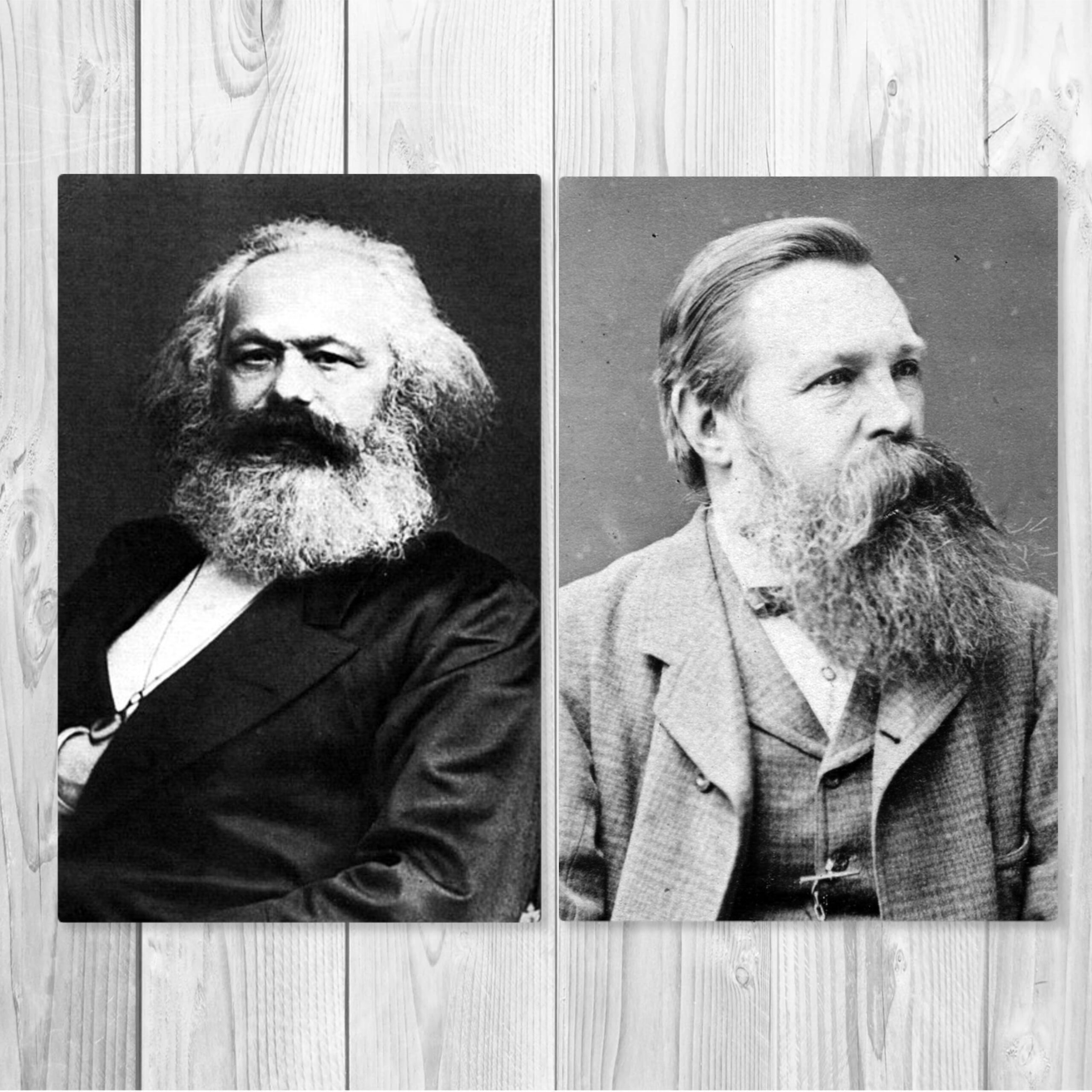
綿業王から金利生活者へ~経営者を引退したエンゲルス、今度は証券投資家に「マルクスとエンゲルスの生涯と思想背景に学ぶ」(56)
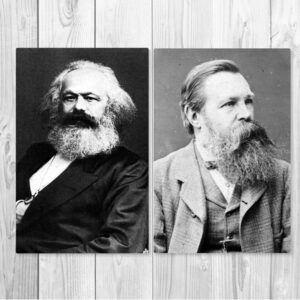
上の記事ではマルクスとエンゲルスの生涯を年表でざっくりとご紹介しましたが、このシリーズでは「マルクス・エンゲルスの生涯・思想背景に学ぶ」というテーマでより詳しくマルクスとエンゲルスの生涯と思想を見ていきます。
これから参考にしていくのはトリストラム・ハント著『エンゲルス マルクスに将軍と呼ばれた男』というエンゲルスの伝記です。
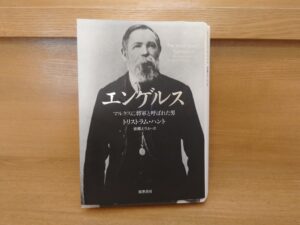
この本が優れているのは、エンゲルスがどのような思想に影響を受け、そこからどのように彼の著作が生み出されていったかがわかりやすく解説されている点です。
当時の時代背景や流行していた思想などと一緒に学ぶことができるので、歴史の流れが非常にわかりやすいです。エンゲルスとマルクスの思想がいかにして出来上がっていったのかがよくわかります。この本のおかげで次に何を読めばもっとマルクスとエンゲルスのことを知れるかという道筋もつけてもらえます。これはありがたかったです。
そしてこの本を読んだことでいかにエンゲルスがマルクスの著作に影響を与えていたかがわかりました。かなり驚きの内容です。
この本はエンゲルスの伝記ではありますが、マルクスのことも詳しく書かれています。マルクスの伝記や解説書を読むより、この本を読んだ方がよりマルクスのことを知ることができるのではないかと思ってしまうほど素晴らしい伝記でした。
一部マルクスの生涯や興味深いエピソードなどを補うために他のマルクス伝記も用いることもありますが、基本的にはこの本を中心にマルクスとエンゲルスの生涯についてじっくりと見ていきたいと思います。
その他参考書については以下の記事「マルクス伝記おすすめ12作品一覧~マルクス・エンゲルスの生涯・思想をより知るために」でまとめていますのでこちらもぜひご参照ください。
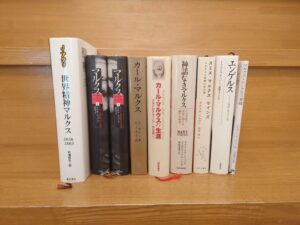
では、早速始めていきましょう。
エンゲルス、綿業王から金利生活者へ
エンゲルスは一八七〇年代の大半を、彼のもう一つの生計手段にかかわって過ごした。エルメン&エンゲルス商会を退職したとき、彼がもらった現金や株式である。もはや綿業王ではなくなったが、今度はマルクス主義が類型的悪党とするタイプ、すなわち金利生活者に変身を遂げていた。
筑摩書房、トリストラム・ハント、東郷えりか訳『エンゲルス マルクスに将軍と呼ばれた男』P342
1869年にマンチェスターの綿工場経営者の立場から引退したエンゲルスは、自分はもう搾取者の立場ではないと誇らしげに喜んでいましたが、なんと、そこから間もなく今度は金利生活者になっていたのでした。

たまたま、彼は非常に好都合な時期を選んでいた。イギリス経済は、エンゲルスが北部から南部へ移動したのを反映するように、その利益の中心地を産業地帯の北部から、金融サービス部門のあるロンドンのシティに移行していた。
経済史学者は十九世紀末の三〇年余りに、農業が不作で価格が下落した時期を〈大不況〉と呼んできた。しかし、定収入のある人びとにとっては、これは好況時代だった。
「当地でわれわれはいま繁栄と好景気の真っ只中にいる」と、エンゲルスは一八七一年に『デア・フォルクシュタート」紙に書いた。「市場には余剰の資本があり、どこでも儲けロを求めている。人類に幸福を与え起業家を潤すために設立されたインチキ会社がキノコのように続々と出現している。鉱山、アスアアルト採掘場、大都市の馬車鉄道、および鉄工所が現在のところ最も好まれているようだ」。
エンゲルスは、〔アンソニー・〕トロロープの才気あふれる小説『いまの暮らし方』に描かれたようなロンドンで豊かに暮らしていた。
株式による資本主義の都市と騒々しい証券取引所、国際的金融家の面々は、トロロープが描いた風変わりな詐欺師オーガスタス・メルモットによって見事に体現されている。
メルモットは「株式を売買することで、どんな会社を興すことも潰すこともでき、自分の好きなようにお金を尊いものにも、安いものにもすることができた」。
それは無数にある商業、金融、運輸、保険、不動産の会社を根城とする黒っぽい服を着た事務員軍団がいるロンドンだった。
マルクス主義の用語で言えば、イギリス経済は独占資本主義のより凝縮した形態へ移行する途上にあった。「〈会社設立〉―大きな個人商店を有限会社に変えること―は、この一〇年余り常態化している」と、エンゲルスは一八八一年に報告した。「シティにあるマンチェスターの大型倉庫から、ウェールズや北部の鉄工所や炭坑、ランカシャーの工場にいたるまで、何もかもが会社として設立されたか、されつつある」。
そしてこの株式市場で新株発行の結果生みだされた余剰資本は、まもなく世界中で利用されることになった。
帝国時代のロンドンは、「世界の手形交換所」となり、ぺルーの鉄道やリスボンの馬車鉄道、〔オーストラリア〕ニューサウスウェールズの鉱山、インドの茶の大農園などに資金を提供していた。
一八七〇年から一九一四年のあいだに、イギリスは世界の外国投資の四四%(フランスの一九・九%、ドイツの一二・八%にたいし)を占めるようになり、帝国内の主要なインフラ整備プロジェクトや採掘産業に益々多くの比率が割り当てられるようになった。
「イギリスは競争力のある経済というよりは、寄生的な存在になりつつあった」と、エリック・ホブズボームは表現する。「世界市場の独占の名残や、発展途上地域、過去の蓄財、およびライバル国の台頭によって生き延びている……。予言者たちはすでに―そして外れることなく―この経済の衰退と崩壊を予測していた。いまやサリー州とサセックス州の株式仲買人べルト地帯にある田舎の邸宅によって象徴され、もはや煙の立ち込める地方都市にいる厳つい顔をした男たちによって代表されるわけではなくなった経済である」
筑摩書房、トリストラム・ハント、東郷えりか訳『エンゲルス マルクスに将軍と呼ばれた男』P343-344
※一部改行しました
1870年代からのイギリス経済の状況がこの箇所からは見えてきますよね。
マルクス・エンゲルスが『資本論』で描いた労働者の地獄、経済のシステムとは違う世界がすでに現れてきていたのでした。
そしてその時流に乗るかのようにエンゲルスは潤沢な資産を用いて証券取引で莫大な利益を得ます。
エンゲルスの最終的なポートフォリオ。驚異の資産額
プリムローズ・ヒルはサリー州からやや離れていたが、エンゲルスは間違いなくこの帝国主義資本家で、株式仲買人の集団の一員だった。矛盾は、工場を辞めた最後の日で終わったわけではなかった。
「僕もまた株を保有し、ときおりそれを売り買いしている」と、エンゲルスはエドゥアルト・べルンシュタインに語ってから、ドイツの亡命中の社会民主主義者による新聞『デア・ゾツィアルデモクラット』に金融専門のぺージを設けるべきかという、いくらかシュールな議論を始めた。
マルクスと同様、エンゲルスは『エコノミスト』を熟読するほうを好んだ。「こうした運用について社会主義の新聞に助言を求めるほど、僕は単純ではない。そんなことをする者は誰でも手痛い目に遭うだろうし、それは当然の報いだ!」
エンゲルス自身の株のポートフォリオは、品揃えも豊富で利益の上がるものだった。彼の遺言からは、二万二六〇〇ポンド相当の持ち株(今日の貨幣に換算すれば約ニニ〇万ポンド)があったことがわかっており、ロンドン・アンド・ノースイースタン鉄道会社、サウス・メトロポリタン・ガス会社、英仏海峡トンネル会社の株のほか、いくつかの帝国関連の投資すら含まれた。とくに注目すべきは〔世界初の投資信託と言われる〕フォーリン・アンド・コロニアル・ガヴァメント・トラスト・カンパニーの株である。
筑摩書房、トリストラム・ハント、東郷えりか訳『エンゲルス マルクスに将軍と呼ばれた男』P344-345
※一部改行しました
なんと、エンゲルスの最終的なポートフォリオは220万ポンド!日本円にして約3億3000万円になります。
エンゲルスは経営者を引退した手切れ金を、持ち前のビジネス感覚を利用してさらに増やしていました。
上の解説にありましたように、「エンゲルスは間違いなくこの帝国主義資本家で、株式仲買人の集団の一員」でした。
「矛盾は、工場を辞めた最後の日で終わったわけではなかった」のです。ブルジョワを激しく非難しながらそのブルジョワそのものであり続けるエンゲルス。
エンゲルスはこの矛盾に対してどのように考えていたのでしょうか。この直後驚くべき言葉が語られます。
自身の矛盾についに開き直るエンゲルス
幸いにも、証券取引への投資は、思想面からも健全なものと見なされていた。「証券取引にたいする抗議をプチ・ブルジョワ的と表現することについては、君は正しい」と、彼はもったいぶってべーベルに告げた。
「証券取引は労働者階級からすでに盗まれた余剰価値の配分を調整するに過ぎない」。むしろ、証券取引は資本を中央に集中させる傾向があるので、これは本質的に革命の目的にかなうものだった。
「それならどんな愚か者でも、いまの経済がどこへ向かうのかを見ることができるからだ」。人はその明白な非道ぶりの先を見通さなければならず、他者の搾取のうえに間接的に暮らすことに恥ずべき点はないことに気づくべきなのだった。
「人は証券取引人であるのと同時に、社会主義者にもなれるのであり、それゆえに証券取引人の階級を嫌い蔑むことにもまったく問題がない」。
もちろん、エンゲルスは矛盾に満ちた人生はよく知っていた。「自分がかつて工場主たちの会社の共同経営者であった事実について、謝罪すべきだなどと思いいたった試しがあろうか?その件で僕を責めようとする人間は誰でも、手厚くもてなされるだろう!」
筑摩書房、トリストラム・ハント、東郷えりか訳『エンゲルス マルクスに将軍と呼ばれた男』P344-345
※一部改行しました
ついに開き直ったエンゲルス。
もっともらしいことを言っていますが、よくよく考えればとんでもないことを言っているのは明らかですよね。
彼がそういう生活をするのは自由です。ですが貧しい人を焚きつけて煽動しようとしている人間が実際にこのような行動をしているのはどう弁解しようが矛盾です。
このエンゲルスの開き直りはまさにジョージ・オーウェルの『動物農場』を連想させます。
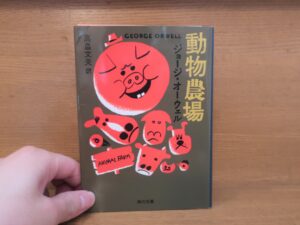
以前この記事でもお話したのですが、せっかくですのでその箇所を引用します。(以下上の記事より。)
崇高な理想を語り、動物たちに夢を見せ、憎むべき敵さえ倒してしまえば理想郷がやってくると豚たちは述べます。しかし、農場主を倒した後、結局その座に収まったのは豚たちで、動物たちは相変わらず、いやもっとひどい生活を送ることになるのです。
この『動物農場』を読んでいてつくづく思うのは、甘い言葉や憎悪を煽る言葉に気をつけねばならないということでした。そしてまた気づくのは豚たちの話術の強さです。彼らの雄弁によって農場の動物たちは「おかしいな」と感じつつもついつい丸め込まれてしまいます。そして気付いた頃には暴力で支配されてしまうのです。しかもそうなったにも関わらずまだ彼らの巧妙な偽装のトリックに騙され続けるのです。
このことについて素晴らしい解説をしている本がありましたのでぜひここに紹介したいと思います。この本については次の記事で改めて紹介しますが、香西秀信著『レトリックと詭弁』という本の中で『動物農場』が次のように紹介されていました。
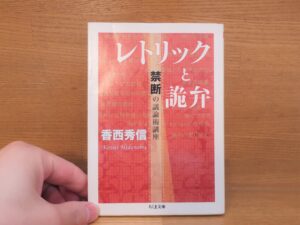
ジョーンズ氏の所有する荘園農場で、酷使されていた動物たちが、豚のスノーボールとナポレオンの指揮によって反乱を起こし、ジョーンズ氏を追放しました。彼らは荘園農場を動物農場と改め、その七戒を定め、「すべての動物は平等である」というスローガンのもと、自分たちの理想郷を作ろうとしました。
だが、その翌日から、早くも様子がおかしくなりました。雌牛から搾られたばかりの牛乳が、いつの間にかどこかに消えてしまったのです。これは、結局、豚たちがこっそりと自分たちのえさにしていたことがわかったのですが、彼らは牛乳のみならず、風で落ちたリンゴまでも独り占めしようとするに及んで、さすがに他の動物たちの間から不満の声が出始めました。そこでナポレオンは、ロの達者な豚のスクィーラーをスポークスマンとして派遣します。
「同士諸君よ!」と彼は叫んだ。「諸君は、まさか、われわれ豚が、がりがり根性で、特権風を吹かして、ミルクやリンゴをひとり占めにするのだ、などとはお考えにならないだろう?実をいえば、われわれのほとんどが、ミルクもリンゴも大嫌いなのだ。わたしも大嫌いだ。そんな大嫌いなものを、なぜ食べるのか、といえば、その目的はただひとつ、健康を保持するためなのだ。ミルクとリンゴは(同志諸君、科学がちゃんと証明しているのだが)、豚の福祉にぜったい欠くことのできない成分を含んでいるのだ。われわれ豚は、頭脳労働に従事している。この農場の運営と組織は、すべてわれわれの双肩にかかっている。われわれは、日夜、同志諸君の福祉に心をくだいている。したがって、われわれがあのミルクを飲み、あのリンゴを食べるのも、ひとえに同志諸君のためなのだ。もしわれわれ豚が、その義務を果たすことができなくなったとしたら、いったいどういう事態が起こるか、諸君はわかるか?ジョーンズがもどってくるのだ!そうだ、ジョーンズがもどってくるのだぞ!それでいいのか、同志諸君」スクィーラーは、右に左に跳ねまわり、しっぽを忙しくふり立てながら、ほとんど嘆願するような調子で絶叫した。「諸君の中で、ジョーンズに帰ってきてほしいなどと願っているものは、ひとりもいないだろう、ええ?」
この決め台詞は効きました。「動物たちにとって、ぜったいに確信できることがひとつあるとすれば、それはジョーンズに帰ってきてもらいたくない、ということだった。それをこんなふうにいわれてみると、彼らは、もう何もいえなかった」からです。
スクィーラーは、この論法の成功に味をしめました。その後、権力争いでナポレオンが革命の功労者スノーボールを追放し、動物たちが動揺したとき、彼は再度派遣されて同様の論法で恫喝しました。「同士諸君、規律だ、鉄の規律だ!これこそ、今日のわれわれの合言葉だ。もし一歩誤れば、われわれの敵は、たちまちわれわれを襲うだろう。いいか、諸君の中には、ジョーンズに帰ってきてほしいと願うものは、ひとりもいないだろう?どうだ?」―「今度もこの議論には、だれもぐうの音も出なかった」
筑摩書房、香西秀信『レトリックと詭弁』P86-88
『動物農場』の特徴が余すことなく解説された文章です。豚たちと動物たちの関係は最初から最後までこのようなものです。いかがでしょうか、段々恐ろしさを感じてきませんか?これはフィクションではなく実際にソ連であったことであり、さらに言えば今だって世界中どこにおいてもこれはありうるのです。いや、今私たちを取り巻いている環境もまさしくこれと同じなのかもしれません。
この言葉の中の「ジョーンズ」の箇所にいろんな言葉を当てはめてみて下さい。ぞっとする現実が見えてきませんか?
これはいつ、どこでも起こりうるから怖いのです。
引き続き解説を見ていきましょう。
あるいは、豚たちが七戒の四に違反して、べッドで寝ているのが露見したとき、彼は再びこれを繰り返しました。豚にとって、べッドで寝ることは健康上必要なのだ。われわれがへとへとに疲れてしまって、義務が果たせなくなってもよいとは誰も考えていまい。「諸君の中に、ジョーンズにもどってきてほしいと願っているようなひとは、ぜったいにいるはずはないんだからね?」―こう言われると、動物たちは、また何も言い返せませんでした。
スクィーラーがここで用いた論法のおかしさは明らかでしよう。彼は、「諸君は、ジョーンズに帰ってきてほしいと願っているのか?」と動物たちに問いかけました。無論、彼らの答えは「いいえ」に決まっています。だが、この意思表示が、そのまま、豚がミルクやリンゴを独り占めしたり、戒律に反してべッドで寝たりすることへの、あるいはナポレオンが独裁者になることへの承認となってしまうのです。
それというのも、スクィーラーが、豚がミルクやリンゴを独り占めしたり、べッドで寝たり、ナポレオンが独裁制を敷いたりするのを認めなければ、ジョーンズが再び帰ってくるという因果関係を前提として問いを出したためです。だから、頭の足りない動物たちは、つい煙に巻かれてこの前提を認めてしまったのですが、もし、ジョーンズが帰ってくることは望まないが、かといって豚たちの特権階級的振る舞いも認めない(すなわち、豚たちの一連の特権階級振りとジョーンズが帰ってくることとの因果関係に納得できない)者がいたとすれば、彼は先のスクィーラーの問いに、「はい」とも「いいえ」とも答えようがありません。ジョーンズが帰ってくることは望まないのだから、もちろん「はい」と答えるはずはない。しかし、もし「いいえ」と答えたら、それによって豚たちの行動を承認したことにされてしまうのです。
筑摩書房、香西秀信『レトリックと詭弁』P88-89
以上、以前の記事より引用しました。
この記事では豚はソ連のあり方を風刺したものとお話ししましたが、これはエンゲルスの生活そのものでもあります。また、マルクスもロンドンで同じようにブルジョワ的な生活をしていたのでした。
ブルジョワを徹底的に批判しながら、自身にお金や権力が集まればあっさりとブルジョワになる二人。
これはマルクス・エンゲルスに限らず、人間の避けられない運命なのではないでしょうか。
金も地位も権力もないうちは、「ブルジョワは敵だ!やっつけろ!」と威勢よく煽動するのです。
しかしいざ金や権力を握ったらどうなるか・・・
それが人間の恐ろしいところです。
「マルクスは無罪だ」と今もなおマルクス主義者側は言います。
ですがもし仮に本当にマルクスが無罪であっても、マルクス思想をイデオロギーにして政治の材料にした場合、その後一体何が起こるのか。
それがここに凝縮されていると思います。だからこそ私はマルクス主義が怖いのです。
いくら平等や理想を語っても、イデオロギーを語るエリートたちは権力を掌握した途端豹変しかねないのです。その危険性はいくら用心してもし過ぎということはありません。
その結果がソ連やその他世界中の共産主義国家で起こったことです。
これはソ連が悪いとかそういうレベルの話を超えて、人間そのものの問題なのです。マルクス主義を政治利用すると人間はこうなってしまいうるのです。
そうした危険性を強調して今回の記事は終わりにしたいと思います。
Amazon商品ページはこちら↓
次の記事はこちら
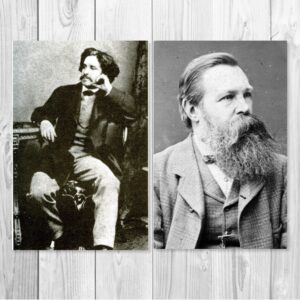
前の記事はこちら

関連記事
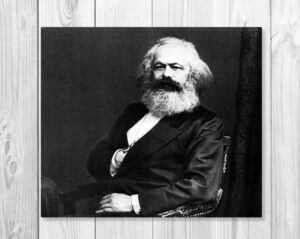





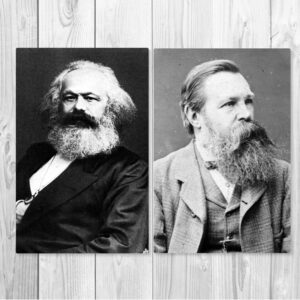
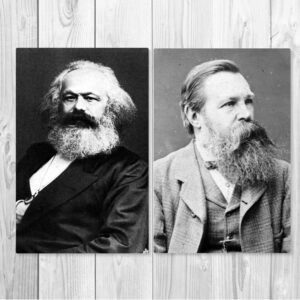
コメント